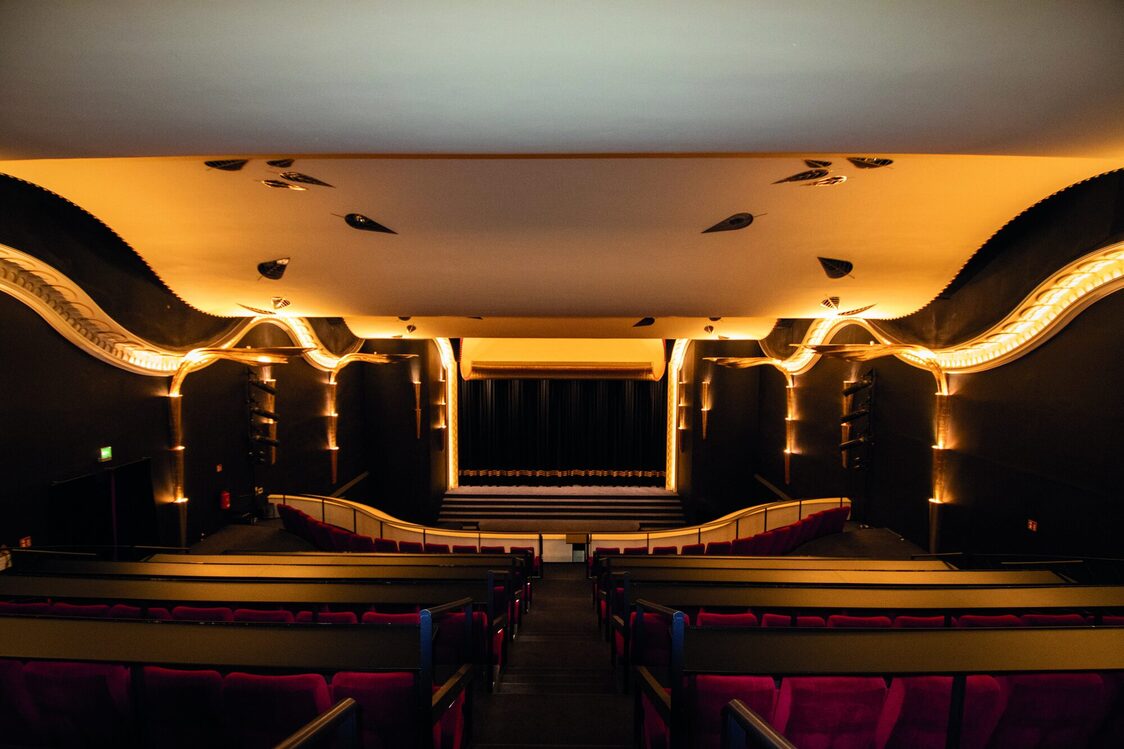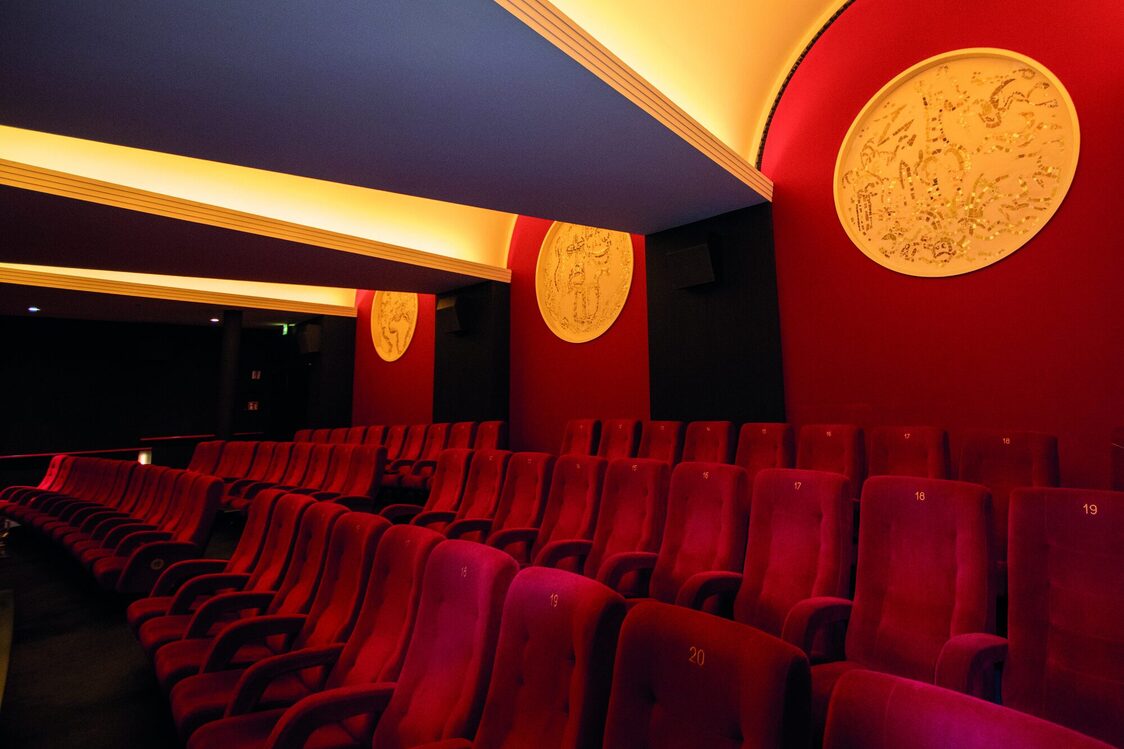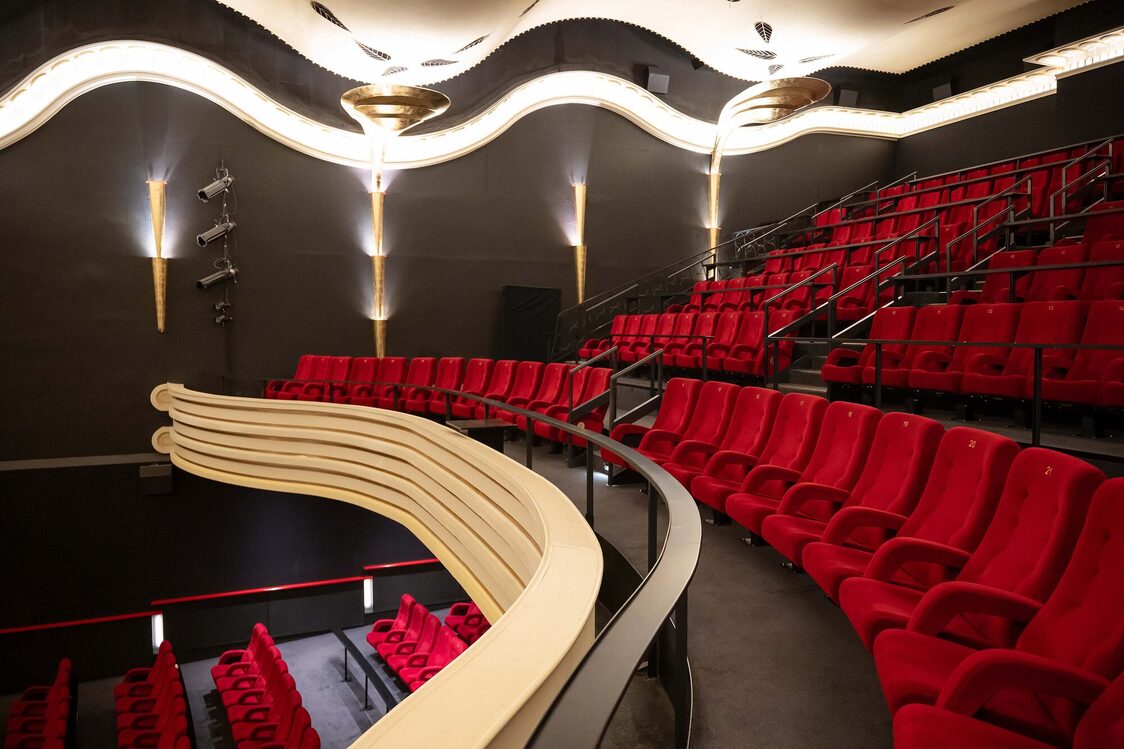On the road in the ... Caligari
According to director Volker Schlöndorff, the Caligari FilmBühne on Marktplatz is "a jewel among German cinemas". I spoke to Claudia Steiger about the beginnings of the Caligari as a silent movie theater, the colorful festival hustle and bustle and what makes the cinema experience simply unique!
The Caligari FilmBühne is currently undergoing renovation and will be even more beautiful afterwards. In 2026, the Caligari will celebrate its 100th anniversary, and there are many highlights to look forward to!
Fräulein Quellgeflüster: The Caligari has a very special interior ...
Claudia: You could say it's unique! The interior and architecture were realized in 1955 according to the plans of architect Ludwig Goerz. It has been largely preserved to this day and is a listed building. Since the major refurbishment in 1999/2000, the hall has been black with golden decorations and a curved wave ceiling. There is a kind of golden curl above the screen, reminiscent of an unrolled film reel. Another special feature are the three round mosaics on the back wall of the hall, which symbolize the types of film: feature film, cultural film and current image report.
Fräulein Quellgeflüster: Not everyone liked the location right opposite the Marktkirche!
Claudia: The church community protested. They feared that cinema-goers could violate the "peace and dignity" of the church. The disputes with the market church board went as far as the Prussian Minister of Public Welfare. He decided to allow the cinema to be built, but on the condition that the façade facing the Marktkirche be "extremely plain". The main entrance was placed in Wilhelmstraße. It virtually went through what was then the Parkhotel, hence the name "Ufa im Park".
"100 years ago, going to the movies was a social event."
Fräulein Quellgeflüster: How can we imagine the first movie screenings?
Caligari FilmBühne: 100 years ago, going to the movies was a social event. Movie nights were festive events where people dressed up. The cinemas were reminiscent of large theater buildings, and the Ufa im Park was a large cinema palace with almost 1,000 seats, today there are 427. The music for silent films was played on an organ - the organ pipes were housed in the vaulted walls to the left and right of the screen. On special occasions, an orchestra played along with the movie. We know from an article in the Wiesbadener Tagblatt that there was an overture with organ sounds for the opening in December 1926 and that an orchestra conducted by Kapellmeister Paul Dessau then played for the opening film "Faust".
Fräulein Quellgeflüster: Your "Silent film with live music" series is a little reminiscence...
Claudia: That's really special. There are only a few cinemas in Germany that can play analog film prints, i.e. in 35mm reels. At the Caligari, these copies are shown at infinitely variable speed, just as they were in the silent film era. Incidentally, the series is organized by the German Film Institute & Film Museum, which has a large film archive, including many silent films such as "The Cabinet of Dr. Caligari", after which the FilmBühne is named. Live music is played on Caligari's own grand piano by pianist Uwe Oberg, winner of the Hessian Jazz Prize. From time to time, there are also silent film screenings with a small orchestra or ensemble.
"As Wiesbaden's municipal cinema, the Caligari has the mission of "showing other films differently".
Fräulein Quellgeflüster: What is the idea behind the FilmBühne today?
Claudia: As Wiesbaden's municipal cinema, the Caligari has the mission of "showing other films differently". The film program is presented in the form of film series, for example retrospectives on filmmakers and thematic series such as the "Wiesbadener Architektur Film Tage". Films by Wiesbaden filmmakers are presented in the "Filmstadt Wiesbaden" series. We often have guests at the events and there are film discussions and introductions. Thanks to our cooperation partners - such as the German Film Institute & Film Museum, the Wiesbaden State Theatre and the Wiesbaden Museum - there is always something new, creative and varied on offer. The "Dream Cinema for Children" and the "Kino macht Schule" series introduce the next generation to the art of film.
"The Caligari will be 100 in 2026 and we can look forward to many highlights!"
Fräulein Quellgeflüster: What are the particular highlights?
Claudia: The highlights are the film festivals: the Homonale in January, the German Television Thriller Festival in March, the goEast - Festival of Central and Eastern European Film in April. The exground filmfest follows in November. In addition, there are guest performances such as the Werkstatt der Jungen Filmszene, which traditionally presents a selected program at Whitsun. The International Festival of Animated Film has also celebrated its opening here for several years. At the festivals, we have many, often international guests with whom the audience can interact directly. As part of our cooperation with the International May Festival, we have already hosted John Malkovich, who subsequently performed at the Staatstheater. Cross-over events are also very popular, such as our film series in honor of Hildegard Knef, which included a closing concert with jazz singer Nicole Metzger. By the way: the Caligari will turn 100 in 2026 and we can look forward to many highlights, that much we can already reveal today 😊!


